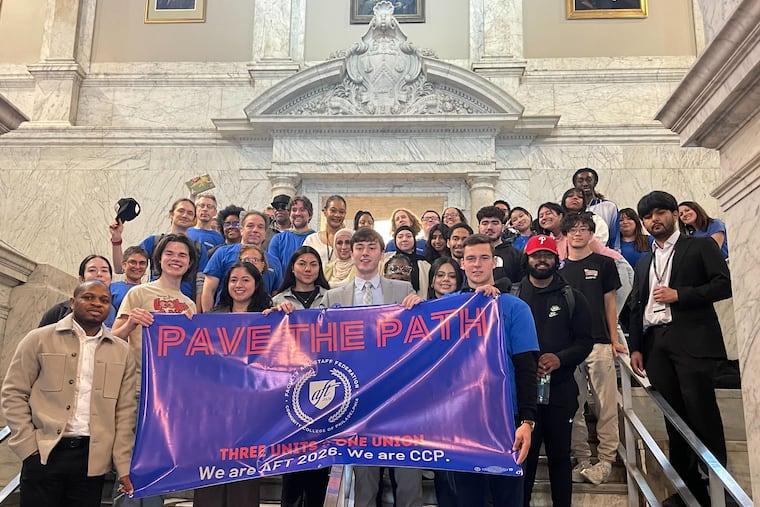Community College of Philadelphia staff and faculty want free transit and childcare help, for students too
College administration said it goes against the bargaining rules to have students present. Students said they want to be involved in negotiations that may affect their education.

When a group of students showed up Friday morning to join negotiations between Community College of Philadelphia and its faculty and staff union, college administration halted talks before they began.
But the student group, including four students who planned to speak at the bargaining table, refused to leave.
They stayed for more than three hours — through the entire scheduled bargaining session — and each time a student had to leave, one or two others took their place, said Marissa Johnson-Valenzuela, an English professor and secretary of the Faculty and Staff Federation of Community College of Philadelphia. By the end, at least 30 students participated.
College officials said through a spokesperson that they left the table Friday morning because students were present, and only union members are permitted to attend the open bargaining sessions. “We have a written agreement for open bargaining rules, which the federation has violated,” college officials said Friday.
Johnson-Valenzuela said a small number of students attended past bargaining sessions this year, but Friday’s group was larger. Administration refused to meet with union representatives while students were present during the designated bargaining time but returned to the room just after noon to hear students’ remarks and questions.
“Students should be able to be involved in the processes that govern our institutions,” said Frank Scales, a freshman and president-elect of the Student Government Association at CCP. Scales, 21, attended the bargaining session to argue that the college should assist students and employees with public transportation costs.
Organized workers at area colleges and universities — both established unions and emergent movements — have been getting louder in recent years, demanding better pay and working conditions. Many of these efforts locally have involved student workers, like graduate-student instructors and researchers at the University of Pennsylvania and resident assistants at Penn, Swarthmore College, and Drexel University.
Students have also stepped up in support of unions that represent their professors, instructors, and staff. Some marched with faculty at Rutgers University when they went on strike last April. A group at Temple University held a walkout and rally last February when graduate student teaching and research assistants went on strike.
At CCP, the students who attended Friday planned to support the union demands that would benefit faculty, staff, and students. In addition to asking for pay increases to meet inflation, the union at CCP is asking for on-campus childcare and free public transit passes. They want those benefits to be available to students too.
English professor Johnson-Valenzuela called the approach “bargaining for the common good.”
“It’s not just better wages — which we definitely need and are fighting for — but we’re also thinking about working conditions and students’ learning conditions,” she said.
The union has been negotiating a new contract with the college since January, and its current contract expires in August. The last agreement with administration was two years ago, extending a contract that was negotiated in 2019.
Because of that extension, the union members haven’t gotten raises in the past couple of years, Johnson-Valenzuela said. Their initial proposal was a four-year contract with raises of 12% the first year, 10% in year two, 8% in year three, and 6% in year four, she said. The college has offered 12% split over three years, the union said.
“We have a good offer on the table, to which they have refused to respond,” college officials said.
“What we want for ourselves is also what we want for our students: dignity, respect, living wages,” union copresident and English professor Junior Brainard said.
The union includes three bargaining units: 319 full-time faculty, about 700 part-time faculty, and about 150 staff, which includes a variety of roles from building maintenance to IT to librarians. The three units have a tradition of signing contracts together.